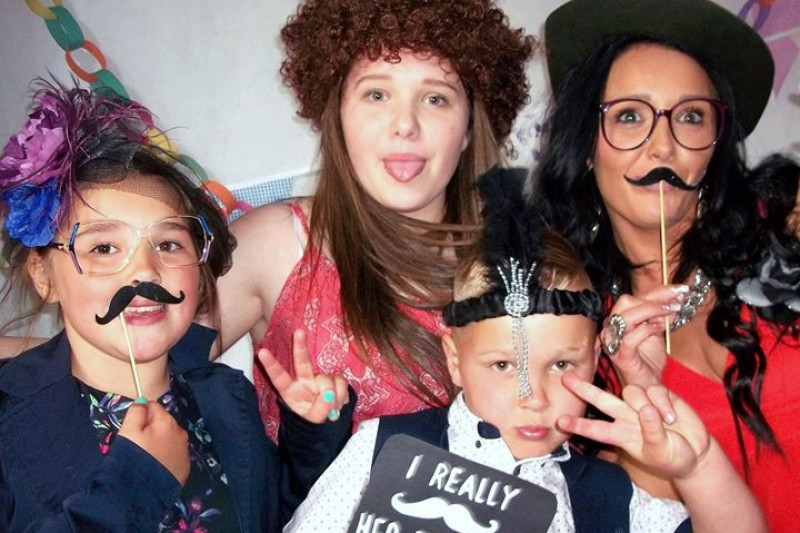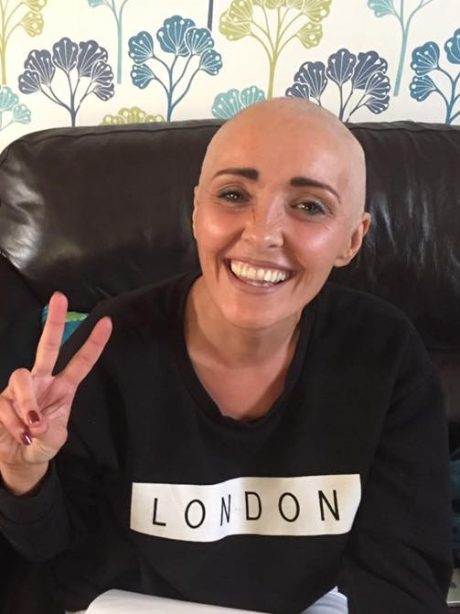How I Explained Cancer To My Children
| 26th April 2017
HOLDING difficult conversations with your children is all part of being a good parent, but nothing can prepare you for the deep heartache faced, when you have to tell your children you have been diagnosed with terminal cancer.

Stacey with her three children, Kendal, Brodie and Riley.
Manchester Mum, Stacey McCarthy, 37, had to do just that, when four months ago she received the devastating news, doctors had discovered she had a rare type of stomach cancer. She was told her prognosis was terminal and to prepare as she may only have 12 weeks to live.
Stacey, talks to VIVA kids’ about how she broke the devastating health news to her three children, Kendal 16, Brodie, 12 and Riley 10, and how she feels, there needs to be more support for children and young people who are in similar situations. Stacey said:
“Nothing, nothing at all, can prepare you. I knew as a Mum I would have to hold difficult conversations with my children, embarrassing talks about puberty and sex, or answering challenging questions about war and sadness shown on TV, but I had never considered, not for a minute that I would have to tell them I had cancer”.
“From the moment I was told in December, it was all that consumed my mind. Even, right there in the room at the hospital. I was with my partner John and my Mum, surrounded by health care professionals, and as they broke the news to me, my children’s faces filled my brain, all I could see was them, images from their baby years till now, flashed before me as I tried contemplate; what about my kids?”
Stacey was given the news that multiple tumours had been found in October, 2016, but she decided not to tell the children straight away.
“I knew something was wrong with me, and I needed time to get my head around the news before I could tell the kids. I was hopeful at this stage that it would be an operation to remove the tumours, and prayed that I may not need chemo. My idea was to tell the kids as little as possible, I never had the intention to mention the c – word.
“We had not been around anyone with cancer, I can’t even think of a time when it was ever spoke about, the kids only knew what they had seen on TV and so I knew they would be scared and hurt. I choose to protect them from that, for as long as I could, but then by December, when the hospital told me I only had twelve weeks left to live, that choice was taken away from me and I knew I had to prepare them. It broke me to have to do this, I never want to make them feel sad”.
Stacey, explained how she had told her daughter Kendal first, she was just 15 years-old, she said:
“I decided to speak to the children separately, to be able to answer the different level of questions that the kids might have, with Kendal being older, I wanted to give her that time for herself.
“We stayed together for a few days, just me and her whilst the other two were with family. I hoped this would give her the opportunity to feel, and to ask what she needed to know.
“Telling my younger kids was horrific, I had Kendal with me and I hoped if they could see that she was ok, they would be too, but they were so full of fear, they thought they might catch it, they had no idea how to respond, it was just devastating.”
About a week after Stacey’s prognosis she received an information leaflet that was designed to help tell your children about cancer and your diagnosis, but it was too late to be of any help. Stacey said:

Stacey helped her children to prepare for the changes in her appearance.
“We had walked that path by then and had come through the other side. It has been a lot of trial and error to get here, but now I am able to talk openly and honestly with the children. I include them and tell them about appointments and treatments and cancer is no longer a scary word. I prepared my children for the worse, spending time writing cards for their milestone birthdays and weddings days, that I feared I wouldn’t get to see.
“I have battled the twelve weeks that they gave me, and then some, and my body is responding well to the different treatments.
“Cancer is horrific but it can bring good too. It changes your outlook of the world as you see it, the smells, noise, everything around. You value time, your life and the family and friends who share it with you.
“It also brings you closer to people. I worried so much about no-one being able to love my children the way I do; like only a mother can, but I know now, they are surrounded by so many people, that love and care for both them and me. I want every child that will go on to face this cancer monster, like my children and I have, to know that you find a way to be OK”.
Dr Genevieve von Lob, Clinical Psychologist and author of Five Deep Breaths: The power of mindful parenting said:
“Receiving a cancer diagnosis is one of the hardest things that any parent has to face and one of the most difficult conversations they will ever have to have with their children.
“It’s very important to look after yourself. You may be in shock, and experiencing a range of overwhelming emotions, so it’s important that you give yourself some time and space to process the news. Talk it through with your partner, friends or family and give them permission to support you in whatever way you need. It’s important to allow yourself to feel the feelings you’re going through. There is no one right way to feel, but you can do your best to be kind and gentle with yourself.
“Children can be surprisingly resilient, and are often very good at coping, provided they receive the right support. All young people have an inner core of strength and resilience. However, it’s worth bearing in mind that children are like tuning forks and will always pick on the feelings of the adults around them. If they sense that you are stressed, or hiding something from them, they will be able to tell – even if you try to put on a brave face. If you don’t speak to them about the cancer diagnosis, and what it means, then they may start “filling in gaps” and coming up with their own ideas about why you are stressed. They may start blaming themselves and think that somehow that they are the cause of your worries.
“It’s important to be as honest as you can and have an open conversation about your diagnosis as soon as possible. As a parent, it’s completely natural to want to shield your children from any form of bad news. But it’s important that your urge to protect doesn’t get in a way of frank discussion. Your children will be better off in the long-run if you’re able to open up enough for them to feel included.”
“Remember, you are the expert on your child and you know them better than anyone, so there can be no fixed formula for how best to broach the subject of your diagnosis.
“If your child or teenager is really struggling you may want to encourage them to speak to a family member or friend who they feel they can open up to, or to seek professional help from a clinical psychologist, counsellor or support group.”
Stacey’s friends and family have been running a number of fundraising events, and have set up a GoFundMe page which will raise money for treatment, alternative therapies and to allow Stacey and her children to make lasting memories, donations can be made at gofundme.com/stacey-mccarthy
